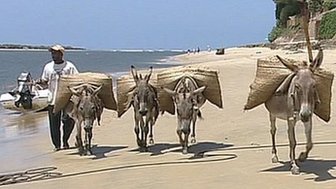Libyan authorities announce Gaddafi death investigation
 The investigation was announced at a news conference
The investigation was announced at a news conference
Libya's new authorities have announced an investigation into the death of Colonel Muammar Gaddafi last week.
It follows international pressure to explain how the former leader was killed, when film footage had shown him alive at the time he was captured.
There has been suspicion that he was shot by his captors, but the new authorities say he died during a gun battle with Gaddafi loyalists.
No details have been given of who will carry out the investigation.
The acting Libyan leader, Mustafa Abdul Jalil, said Col Gaddafi's opponents would prefer to have seen him stand trial and then suffer in prison.
Gaddafi supporters, he said, had had the most to gain from their leader's speedy death.
"Those who wanted him killed were those who were loyal to him or had played a role under him. His death was in their benefit."
Mr Abdul Jalil said the ruling National Transitional Council (NTC) had set up a committee to consider when and where Gaddafi should be buried.
His body is in the city of Misrata where it was taken on the day he died during the final battle for his hometown, Sirte.
The Reuters news agency has reported an announcement from the NTC that the former leader's body will no longer be kept on public view.
Reports say the gates at the cold storage unit where the body was on display have now been shut.
Sharia lawOn Sunday, there were celebrations across Libya when Mr Abdul Jalil declared the country liberated.
NEXT STEPS

- Elections for a Public National Conference to be held within eight months
- The new body is to appoint a prime minister, an interim government and a constituent authority which will draft a new constitution within 60 days
- Constitution to be put to a referendum
- If the constitution is approved, general elections will be held within six months
However, Western governments expressed misgivings about his statement that Libya would take Islamic law as the source of its legislation.
In his statement on Monday, Mr Abdul Jalil sought to address those concerns.
"I would like to assure the international community that we as Libyans are moderate Muslims," he said.
France had earlier said it would keep an eye on Libya's attitude to human rights.
"We will be watchful of respect for human rights and democratic principles," said French Foreign Ministry spokesman Bernard Valero.
The campaign group Human Rights Watch says the bodies of 53 Gaddafi loyalists have been found at a hotel in the Libyan city of Sirte.
The group says the victims had their hands bound and appeared to have been executed.
Human Rights Watch has called for an investigation.
The new Libyan authorities have denied any involvement in abuses and have urged Libyans to avoid reprisal attacks on Gaddafi loyalists.


 As it happened
As it happened Gaddafi loyalists 'were executed'
Gaddafi loyalists 'were executed' Frantic search after Turkey quake
Frantic search after Turkey quake American Bolshoi premier
American Bolshoi premier Paying the penalty
Paying the penalty  Seven billion and counting
Seven billion and counting In a fix
In a fix Where's the beef?
Where's the beef? Fast Track
Fast Track